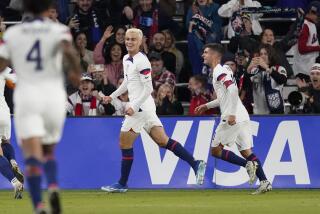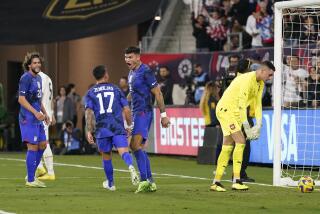Ghana defeats Serbia, 1-0, on penalty kick
- Share via
reporting from pretoria, south africa — — The first World Cup on African soil was meant to highlight the continent’s growth as a soccer power.
But it has also focused a spotlight on an area where Africa is lagging — in the coaching ranks.
Although six of the 32 nations in this year’s tournament are from Africa, Algeria’s Rabah Saadane is the only coach who was born there.
Sunday’s Serbia-Ghana match had twice as many coaches from Yugoslavia, a country that no longer exists, as the entire World Cup has coaches from Africa, the world’s second-most populous continent.
That used to be a sore subject in Ghana, where fans were hoping a homegrown coach would get a chance to direct the national team when Frenchman Claude Le Roy quit two years ago.
Instead, Ghana turned to Milovan Rajevac. And if there are those who are still unhappy, they’re keeping it to themselves because Rajevac has the Black Stars believing they can go far in this World Cup, a journey they started Sunday with a 1-0 win over Serbia on a penalty-kick goal by Asamoah Gyan with five minutes left in the Group D opener for both teams.
The goal also gave Africa its first win in its World Cup, something Ghana recognized with a flag-waving postgame celebration.
“Every African,” Gyan said, “is behind us.”
Even Rajevac, who had to become something of an honorary Ghanaian during the run-up to Sunday’s game against a team from the land where he was born.
“I am 100% Ghanaian,” he pledged.
Well, not really. As defender Ibrahim Ayew joked, the team had to teach its coach what African soccer was all about.
“He used to make us play more defensive. But for the Black Stars, our play is not defensive,” Ayew said. “We always attack. We play like the African Brazilians.
“You know we are the best in Africa. So we teach him. He tells us to do something, and we go and change it. That’s the way we play.”
And while they didn’t always play well Sunday, they played well enough to turn a pair of late Serbian mistakes into a victory.
The first error came in the 74th minute, when defender Aleksandar Lukovic was sent off for a second yellow card, leaving his team to play short-handed. And that may have led to the second mistake, when defender Zdravko Kuzmanovic, trying to cover some extra ground, appeared to misjudge the unpredictable flight of the World Cup match ball, the unsteady Adidas Jabulani.
When the ball bounced off his wrist instead of his head, Argentine referee Hector Baldassi awarded a penalty shot.
“It was a tough call,” Kuzmanovic complained later.
Gyan made it sting even more when he took a deep breath, then lined a right-footed shot just under the crossbar.
It was hardly a convincing win, but you wouldn’t have known that from listening to the confident Ghanaians afterward. Four years ago, Ghana upset the U.S. and advanced to the second round in its World Cup debut. That won’t do this time, with Inter Milan midfielder Sulley Muntari talking of a spot in the semifinals “or even further” — a goal made more challenging by the loss of star midfielder Michael Essien to a knee injury.
“It’s a big loss,” said Dede Ayew, Ibrahim’s younger brother and the son of African soccer legend Abedi Ayew. “And it will always be a big loss to not have Michael on the team.”
But it hasn’t made them any humbler. Australia is next up for Ghana, and at least one player was already counting that as a win and enough points to advance out of group play.
“When we win against them,” said defender Hans Sarpei, “then we are in the next round.”
For Dede Ayew, however, this World Cup is about more than wins and losses. It’s about a continent. And what a bunch of players from Ghana, playing under a coach from Yugoslavia, can do to make the rest of the world see Africa in a different light.
“If we win or we lose, we don’t know about that,” he said. “But [what] we know is that we’re going to fight to make our continent and everybody proud.
“We’re not the hope of Africa. You have South Africa, we have Algeria, you have Cameroon and Ivory Coast. They are great teams.
“So we are just going to continue fighting for the continent. And we are going to fight to make the continent proud. We hope that something good is going to come out of it.”
More to Read
Go beyond the scoreboard
Get the latest on L.A.'s teams in the daily Sports Report newsletter.
You may occasionally receive promotional content from the Los Angeles Times.







